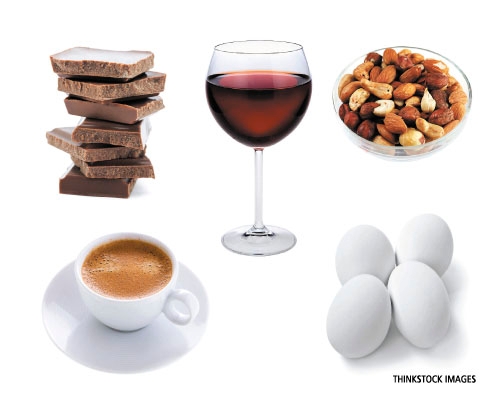Foods once considered evil can boost health if eaten in moderation, nutritionist says

With the hectic holiday season upon us, don’t be surprised if you find yourself relying more on the four major food groups to keep you going: chocolate, coffee, wine and fat.
While all of that sounds horribly bad for you, don’t despair. Those food groups aren’t necessarily the building blocks of an unhealthy diet. In fact, they can even be good for you.
Sort of.
"I don’t like to put foods in good or bad categories," says Madeleine Sigman-Grant, a nutritionist with the University of Nevada Cooperative Extension.
And recent research shows that she may have the right approach. Last month, researchers released a study that said coffee may prevent skin cancer. In September, British researchers said that chocolate may be good for your heart.
"It seems we have a cycle and I think it gets really confusing," Sigman-Grant says.
And in her 30 years in the nutrition field, she has witnessed that cycle with foods being declared deadly during one decade and healthful in the next. About 20 years ago, eggs were said to contain so much cholesterol that they should rarely, if ever, be eaten, she says. In the past few years, scientists have declared them important to a healthy diet for the nutrients they contain.
Fat used to be verboten. Now, nutrition experts know that certain fats, such as olive oil and the fat found in avocados, have many health benefits. Years ago, nutritionists warned against eating apple skins because of pesticide residue. Now, nutritionists label apple peels as a healthful part of the fruit, she says.
"In science, we try to look at a component of a food in regards to a health outcome," Sigman-Grant says. "We forget that food has many components. While it may have something in it that is bad for you, the good benefits of the whole food may outweigh that."
When eating, especially during hectic times, it’s important to balance your foods, she says. You can have anything so long as it’s in moderation. That means taking a realistic approach to food and diet.
Instead of calling foods "bad," label them "go, slow and whoa." Go foods, such as vegetables and lean meats, can and should be eaten frequently. Slow foods, such as red wine and chocolate, should be limited and whoa foods (fried chicken or french fries) are an occasional treat, Sigman-Grant says.
Where nutritionist Madeleine Sigman-Grant stands on a few things previously labeled "unhealthy":
COFFEE
The results of a study released in late October found that coffee drinkers have a new reason to stick with their morning brew. A researcher in the department of dermatology at Brigham and Women’s Hospital and Harvard Medical School said that drinking coffee may help prevent basal cell carcinoma. The same benefit was not found for squamous cell carcinoma or melanoma.
And the benefits may have a connection to coffee’s caffeine, as decaf coffee did not decrease the risk of skin cancer, according to the study.
The cancer risk was reduced by 20 percent in women who drank more than three cups of coffee per day. Men who also drank three cups a day had a 9 percent risk reduction compared with those who had less than a cup of coffee per month.
CHOCOLATE
While chocolate shouldn’t be the base of your food pyramid — it’s highly caloric, depending on what it’s mixed with — it can still be one of the bricks.
In September, British researchers did a review and meta-analysis of seven chocolate studies. They looked at the effect chocolate has on cardiovascular health. Five of those studies showed significant benefits of chocolate, at least for heart health. The study says, "chocolate consumption has a positive influence on human health, with antioxidant, antihypertensive, anti-inflammatory, anti-atherogenic, and anti-thrombotic effects as well as influence on insulin sensitivity, vascular endothelial function, and activation of nitric oxide."
In other words: Chocolate = good. In moderation, Sigman-Grant says.
WINE
For decades, red wine has been said to have beneficial health effects because it contains antioxidants, Sigman-Grant says. It has since been discovered that white wine and even grape juice have the same antioxidants but not in the amounts found in red wine. Researchers are still trying to figure out what it is in wine that is so beneficial, she adds. It might have anti-inflammatory properties or something else. The details aren’t all that important if you like to drink your wine, though. Just enjoy it in moderation and know that you’re drinking to your health.
NUTS
Nuts are very high in fat, Sigman-Grant says. But that doesn’t mean you should avoid them. They contain omega-3 fatty acids, the good fat, as well as vitamins, fiber and more. And there are some nuts that are better for you than others. Pistachios have a lower fat content while macadamia nuts are higher. Almonds and walnuts are said to have higher concentrations of the good stuff. You really can’t go wrong with choosing one nut over another, Sigman-Grant says. But remember: Eating a few nuts means eating a few nuts. Not a whole can.
EGGS
For 20 or 30 years, eggs may as well have been the devil’s food, they were considered so bad for you. They have a high level of cholesterol, which is supposedly bad for you, Sigman-Grant says. And all that bad stuff was thought to be in the yolk. Nutritionists used to recommend avoiding eggs at all costs. Now, they recommend about three eggs a week and by all means, eat the yolk because it has tremendous amounts of good stuff in it. Even an egg a day can be good for you.